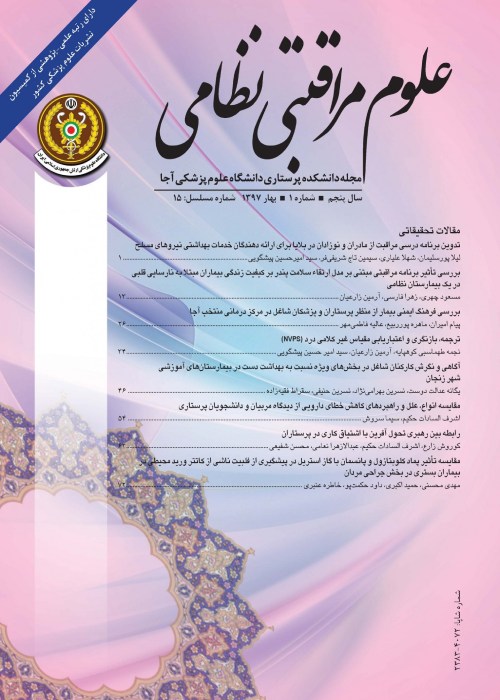Evaluation of critical care nurse's knowledge of evidence-based guidelines for prevention of ventilator-associated pneumonia
Author(s):
Abstract:
Introduction
Ventilator-associated pneumonia (VAP) is the second most common nosocomial infection overall and the most common nosocomial infection among mechanically ventilated patients in the intensive care units (ICUs). It is associated with significant morbidity and mortality. Considering the importance of prevention of VAP in patients undergoing mechanical ventilation, the aim of this study was to evaluate the critical care nurses’ knowledge of evidence-based guidelines for prevention of VAP.Materials and Methods
In a descriptive cross-sectional study, a total of 120 critical care nurses who worked in the ICUs of in Amol and Sari city in 2013, were evaluated. A three part self-reported questionnaire including personal information, multiple choice questions for evaluation of the nurses’ knowledge regarding evidence-based guidelines for prevention of VAP and questions about the barriers of implementing evidence-based practices regarding prevention of VAP in their wards were used for data collection. The collected data were analyzed using descriptive statistics, Pearson correlation coefficient, independent t-test, ANOVA and multiple regression analysis (adjusted) using SPSS 20 software.Results
The results of the present study have shown that among all of the participants, 14 (11.6%) were male and 106 (88.33%) were female, with mean±SD age of 32.45±6.11 and average work experience was 8.01±5.005 years. The lowest level of knowledge of nurses (0.5%) were about using endotracheal tubes with extra lumens for drainage of subglottic secretions and the highest level of their knowledge (92.5%) were about the appropriate position for reducing the incidence of VAP in patients undergoing mechanical ventilation. Regarding taking actions based on the evidence in the prevention of VAP, 57.5% of nurses stated that some of these actions are performed routinely in their workplace. Multivariate linear regression analysis revealed that with an increase of one year of work experience, nurse’s knowledge scores have been increased by 10%.Discussion & Conclusion
Considering the low level of nurses’ knowledge about evidence-based guideline in the prevention of VAP and its important role in this regard; allocation of resources and educational programs regarding evidence-based practice guideline for prevention of VAP and therefore changes of caring methods in patients undergoing mechanical ventilation, can have an important role in the prevention of VAP in these patients.Keywords:
Language:
Persian
Published:
Journal of Military Caring Sciences, Volume:2 Issue: 1, 2015
Pages:
14 to 23
magiran.com/p1437762
دانلود و مطالعه متن این مقاله با یکی از روشهای زیر امکان پذیر است:
اشتراک شخصی
با عضویت و پرداخت آنلاین حق اشتراک یکساله به مبلغ 1,390,000ريال میتوانید 70 عنوان مطلب دانلود کنید!
اشتراک سازمانی
به کتابخانه دانشگاه یا محل کار خود پیشنهاد کنید تا اشتراک سازمانی این پایگاه را برای دسترسی نامحدود همه کاربران به متن مطالب تهیه نمایند!
توجه!
- حق عضویت دریافتی صرف حمایت از نشریات عضو و نگهداری، تکمیل و توسعه مگیران میشود.
- پرداخت حق اشتراک و دانلود مقالات اجازه بازنشر آن در سایر رسانههای چاپی و دیجیتال را به کاربر نمیدهد.
In order to view content subscription is required
Personal subscription
Subscribe magiran.com for 70 € euros via PayPal and download 70 articles during a year.
Organization subscription
Please contact us to subscribe your university or library for unlimited access!


